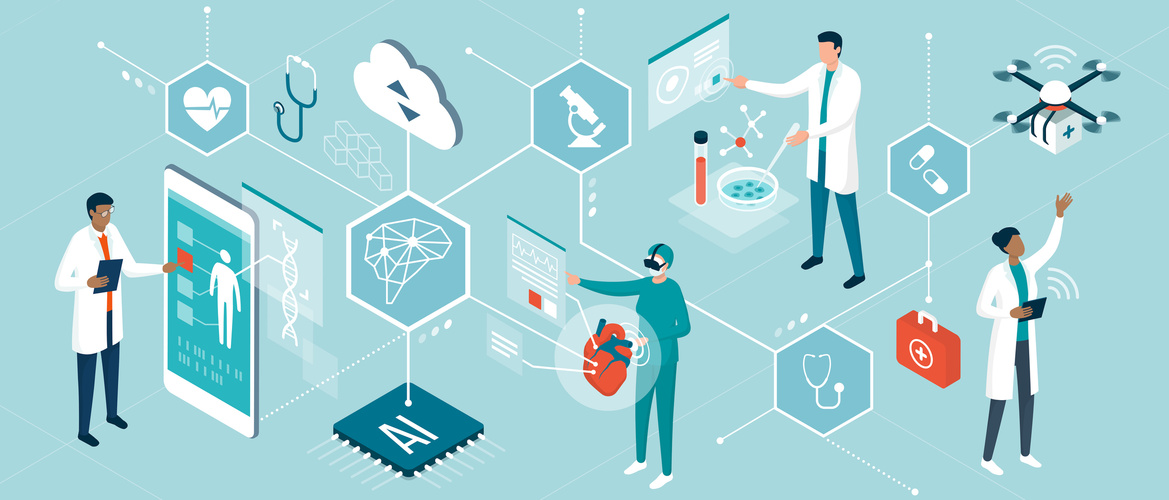
Choose a channel
Check out the different Progress in Mind content channels.

Progress in Mind

Artificial intelligence (AI) is already disrupting healthcare in many areas. Will it eventually replace the physician or is there scope for collaboration? This was the hot topic discussed at AAN Virtual 2022.
What is AI?
Dr Mark Mintz (NeurAbilities Healthcare) introduced AI as a concept that continues to evolve over time, but essentially means simulating human intelligence processes by computer systems or machines.
Simulating human intelligence processes by computer systems or machines
AI is a collection of technologies.1,2 Machine Learning (ML) involves designing and training software algorithms to learn from as well as take on new data. A more complex form of ML are neural networks, a series of algorithms recognizing underlying relationships in a set of data by mimicking the working processes of the human brain. The most complex form involves Deep Learning, neural network models with many levels of variables that can be used to predict outcomes. In radiology this could not only identify abnormal lesions but determine if they are benign or malignant. Individual aspects of such algorithms may not make sense to us as humans, and it can be difficult to interpret how AI achieved the answers.
How can AI be used?
One subfield of AI is natural language processing1 involving the interaction between computers and human language. This allows speech recognition, text analysis and translation, and medical applications include transcribing patient interactions and analyzing clinical notes.
Robots are another subfield of AI,1 with AI being used as the ‘brain’ of a physical robot. In surgery they can perform precise, minimally invasive procedures and be operated remotely. A physical robot is not always required, and robotic processing automation describes structured digital tasks carried out for administrative purposes using computer programs on servers.
Why do we need AI?
Machine learning can utilize this data to learn and make better decisions
Big Data is helping to make sense of the immense amount of data that has been created by the Internet of Things. Machine learning can utilize this data to learn and make better decisions. Dr Mintz predicts that eventually there will be blurring between the physical, digital and biological worlds. This could result in brain-machine and maybe even brain-brain interfaces, with great potential for people with disabilities.
AI and healthcare
AI has many potential healthcare applications1 including:
AI has many potential healthcare applications
AI is already being used in the analysis and interpretation of diagnostic imaging, drug discovery, and patient risk identification.2 It allows repetitive tasks to be carried out 24/7 with precision and without fatigue. Work efficiencies could be improved at reduced costs.
Promises and challenges
New technologies bring challenges as well as promises.2 Human error may be reduced but what about machine error? Who will be held legally responsible for the decisions that are made and what if we consider the decisions unacceptable? What about the risk of cyber-attacks? Will AI replace or augment the role of the physician and what impact will this have on medical training?
Dr Mintz suggested that healthcare professionals will need to gain trust in AI,4 rethinking skill acquisition and medical education.5 It will be important to develop robust regulatory standards and to involve patients and families in algorithm design.2
Augmented intelligence
Augmented intelligence to support, rather than replace, the clinician
Dr Michael Segal (SimulConsult) concluded by encouraging human-machine collaboration,5 with the aim of augmented intelligence or human-centered AI. His company6 has developed a platform involving software and a computable, peer-reviewed, continuously updated, database of diseases and their symptoms/signs to assist clinicians in making diagnoses and planning care. This augmented intelligence platform uses pattern matching to support, rather than replace, the clinician, providing results that are iterative and explainable.
Our correspondent’s highlights from the symposium are meant as a fair representation of the scientific content presented. The views and opinions expressed on this page do not necessarily reflect those of Lundbeck.